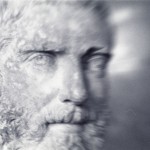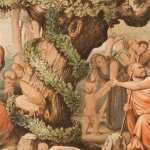The sun is back out after a couple days of rain. Grey and rainy days get me down. An area of low atmospheric pressure characterized by rain and unstable weather is called a “depression”. Like the sky is depressed.
For some reason, probably not coincidentally, I decided to pick up the book, The Hours, by Michael Cunningham. It’s a depressing book to say the least. It’s about life, death, suicide, illness, love (hetero- and homo-sexual). I loved the movie. It’s one of the few movies I’ve seen that I think does justice to the book. In fact, I think the movie is better. The message of the book is summed up well by a quote at the end of the movie:
To look life in the face,
Always,
To look life in the face
And to know it for what it is.
At last to know it,
To love it for what it is,
And then,
To put it away.
And then, to make matters worse, I decided to download the pre-theatrical release of Melancholia, a new film starring Kirsten Dunst.

It’s beautiful. That’s for certain. But its also very depressing. It’s about a depressive woman and how she keeps her shit together better than the sane people when the world comes to an end.
I’ve never really been deeply depressed. Well, maybe I was after law school when I was job hunting. And maybe I was before we bought our house and we had been stuck in a two bedroom apartment for years. And maybe I was after reading Revolutionary Road (I’ll post about that sometime). And I know I was after my uncle Dan committed suicide. Okay, so I have been depressed. But never so much that I could not attend to the activities of daily living. I can’t say I know that debilitating kind of depression, but I do know depression — like an atmospheric condition of the soul, that comes and goes like the sun and the rain.
I’ve come to accept depression as part of the ebbs and flows of my soul. When depression comes, I let it come. I embrace it, knowing it will pass. I don’t wallow in it exactly, but I accept it. I didn’t consciously think to myself, “It’s raining, I should read a depressing novel about suicide and watch a movie about the end of the world.” But nevertheless that’s what I felt like doing, so I did it.
Neo-Jungian theorist, James Hillman, has argued that popular therapeutic attempts to eliminate depression are a product of a “Christian” ideal which is obsessed with light and positive feelings. This mode of thought demonizes depression, which to Hillman is counterproductive:
“Depression is still the Great Enemy. More personal energy is expended in manic defenses against, diversions from, and denials of it than goes into other supposed psychopathological threats to society: psycho-pathic criminality, schizoid breakdown, addictions. As long as we are caught in cycles of hoping against despair, each productive of the other, as long as our actions in regard to depression are resurrective, implying that being down and staying down is sin, we remain Christian in psychology.”
This “Christian” psychology is something I know well. I was raised Mormon. And in Mormonism, there is an understanding that righteous people are happy, and unrighteous people are unhappy. Therefore, if you are depressed, you must be sinning. I have heard that the reason why Utah Valley is called “Happy Valley” is because it has the highest per capita consumption of antidepressants. I don’t know if that is true, but I do know that there is incredible pressure on Mormons, especially Mormon women, to appear happy. Of course, from a Jungian perspective, this is a gross from of repression. According to Hillman, depression is, or can be, actually a means for psychological growth:
“Yet through depression we enter depths and in depths find soul. […] The true revolution (in behalf of soul) begins in the individual who can be true to his or her depression. Neither jerking oneself out of it, caught in cycles of hope and despair, nor suffering it through till it turns, nor theologizing it – but discovering the consciousness and depths it wants. So begins the revolution on behalf of the soul.”
I have tried to be true to my times of depression, by not fighting against it, nor clinging to it, by wallowing in it, but feeling it fully and then letting it go when it goes. I have tried to let it teach me, not propositional truth, but a depth of feeling.
In his essay, “Nothing Almost Sees Miracles: Self and No-Self in Psychology and Religion”, David Miller (another Jungian) relates depression to the “dark night of the soul” and the apophatic spiritual tradition. He wonders if depression could not be a friend to us:
“Could it be that the epidemic psychological depression in North America may be a concealed wish for spirituality, but not spirituality in the sense of conventional positive, literalistic religion, nor in the sense of a New Age spiritual transcendence of darkness? Could it be that the malaise so many feel really wants not to be gotten rid of, not healed, but deepened and, like the neurosis, ‘accepted as our truest and most precious possession.’ “
Similarly, another Jungian, Monika Wikman, writes in Pregnant Darkness: Alchemy and the Rebirth of Consciousness that depression does in an involuntary way what we seek to do voluntarily in spiritual practice: it courts the soul.
“Over the years I have gathered evidence of something beyond ordinary consciousness coming into people’s lives, helping them into an unexpected state of grace, transformation, and rebirth. Our deepest darknesses are pregnant with incredible life energy.
“Cultivating a living relationship with the mysteries of the psyche and psychoid depends on our ability to go into the darkness, dim the light of the ego, and attend to what appears. We descend into the darkness voluntarily when we meditate or engage in any kind of spiritual practice, dream work, active imagination, shamanic journeying, creative endeavor, and so on. We descend involuntarily through depression and crises, such as health problems, loss of love, loss of position, and so on. […]
“[…] both of these paths, the active one where we court the soul, and the one in which crisis pulls us into the psyche, can lead us to the source of transformation and renewal.”
(emphasis added).
I believe this to be true, in my case at least. I have never struggled with debilitating, numbing depression, so I cannot speak to the experience of those who have. But I do know the times of depression and times of enthusiasm that I imagine must ebb and flow through most people’s lives to one degree or another. And I do know what damage a forced and feigned happiness can do to the psyche. It is not about knowing the bad so you can experience the good. I have actually felt that my times of depression have been healing. I feel they have added a depth to the experience of my life, a depth that helps me to feel everything more intensely.















